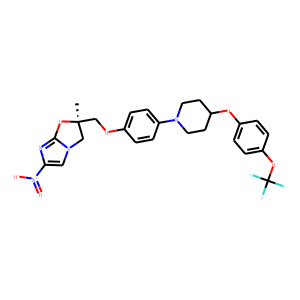| Reference | 1. Infect Drug Resist. 2015 Oct 30;8:367-78. doi: 10.2147/IDR.S68351. eCollection
2015. <br />
<br />
New developments in the treatment of drug-resistant tuberculosis: clinical
utility of bedaquiline and delamanid. <br />
<br />
Brigden G(1), Hewison C(2), Varaine F(2). <br />
Author information: <br />
(1)Access Campaign, Médecins Sans Frontières, Geneva, Switzerland.
(2)Medical Department, Médecins Sans Frontières, Paris, France. <br />
<br />
The current treatment for drug-resistant tuberculosis (TB) is long, complex, and
associated with severe and life-threatening side effects and poor outcomes. For
the first time in nearly 50 years, there have been two new drugs registered for
use in multidrug-resistant TB (MDR-TB). Bedaquiline, a diarylquinoline, and
delamanid, a nitromidoxazole, have received conditional stringent regulatory
approval and have World Health Organization interim policy guidance for their
use. As countries improve and scale up their diagnostic services, increasing
number of patients with MDR-TB and extensively drug-resistant TB are identified.
These two new drugs offer a real opportunity to improve the outcomes of these
patients. This article reviews the evidence for these two new drugs and discusses
the clinical questions raised as they are used outside clinical trial settings.
It also reviews the importance of the accompanying drugs used with these new
drugs. It is important that barriers hindering the use of these two new drugs are
addressed and that the existing clinical experience in using these drugs is
shared, such that their routine-use programmatic conditions is scaled up,
ensuring maximum benefit for patients and countries battling the MDR-TB crisis. <br />
<br />
2. Drugs. 2015 Jan;75(1):91-100. doi: 10.1007/s40265-014-0331-4. <br />
<br />
Delamanid: a review of its use in patients with multidrug-resistant tuberculosis. <br />
<br />
Blair HA(1), Scott LJ. <br />
Author information: <br />
(1)Springer, Private Bag 65901, Mairangi Bay 0754, Auckland, New Zealand,
[email protected]. <br />
<br />
Delamanid (Deltyba(®)), a nitroimidazo-oxazole derivative, is a new
anti-tuberculosis (TB) drug which exhibits potent in vitro and in vivo
antitubercular activity against drug-susceptible and -resistant strains of
Mycobacterium tuberculosis. It is approved in several countries, including Japan
and those of the EU, for use as part of an appropriate combination regimen in
adults with multidrug-resistant tuberculosis (MDR-TB) when an effective treatment
regimen cannot otherwise be composed due to resistance or tolerability. In a
robust phase II trial in adult patients with MDR-TB, oral delamanid 100 mg twice
daily for 2 months plus an optimized background regimen improved sputum culture
conversion rates to a significantly greater extent than placebo. In a 6-month
extension study, long-term (≤8 months) treatment with delamanid was associated
with a higher incidence of favourable outcomes (i.e. cured or completed all
treatment) than short-term (≤2 months) treatment, with an accompanying reduction
inunfavourable outcomes as defined by the WHO (i.e. pre-specified proportion of
TB-positive sputum cultures, death or treatment discontinuation for ≥2 months
without medical approval). Delamanid was not associated with clinically relevant
drug-drug interactions, including with antiretroviral drugs and those commonly
used in treating TB. Delamanid was generally well tolerated in patients with
MDR-TB, with gastrointestinal adverse events and insomnia reported most commonly.
Although the incidence of QT interval prolongation was higher with
delamanid-based therapy, it was not associated with clinical symptoms such as
syncope and arrhythmia. In conclusion, delamanid is a useful addition to the
treatment options currently available for patients with MDR-TB. <br />
<br />
3. The Use of Delamanid in the Treatment of Multidrug-Resistant Tuberculosis:
Interim Policy Guidance. <br />
<br />
Geneva: World Health Organization; 2014.<br />
WHO Guidelines Approved by the Guidelines Review Committee. <br />
<br />
Drug resistance is a major threat to global tuberculosis (TB) care and control.
WHO estimates that around 480,000 new multidrug-resistant tuberculosis (MDR-TB)
cases occured in 2013. Current treatment regimens for drug-resistant TB are
complex, lengthy, toxic and expensive. Only about one half of MDR-TB patients
started on treatment globally are reported to be treated successfully, largely
due to a high frequency of death and loss to follow-up, commonly associated with
adverse drug reactions and high costs of treatment. In addition, it is estimated
that up to a third of MDR-TB cases may have strains with additional resistance to
fluoroquinolones and/or injectable second-line drugs (aminoglycosides or
capreomycin), rendering their treatment even more difficult, with recourse only
to highly toxic drugs. The landscape of drug development for treatment of TB has
evolved over the past ten years and novel drugs are presently or soon entering
Phase III trials for the treatment of MDR-TB. Considering the global MDR-TB
crisis, the limited therapeutic options available for this life-threatening
condition, and the need to promote safe and responsible use of TB drugs, WHO
convened an Expert Group in April 2014 to review the available evidence on the
efficacy, safety and effectiveness of delamanid, a new drug for the treatment of
MDR-TB, with the view to issue interim recommendations on its use in conjunction
with WHO-recommended MDR-TB treatment.
|

